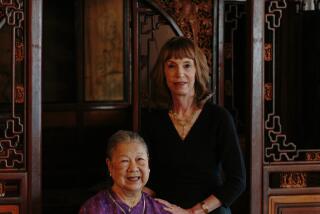Marion Tanner Dies; Inspired ‘Auntie Mame’
Marion Tanner, a carefree Bohemian whose life style evidently was the inspiration for her nephew’s novel “Auntie Mame,” has died.
Miss Tanner, who was 85, according to the Associated Press, but 94 according to the New York Times, died Wednesday at the Village Nursing Home in New York’s Greenwich Village. She had lived in the home for several years and in Greenwich Village itself since 1927 when she bought a house there and made it a gathering place for local extremists and devotees of the arts.
Like “Mame,” Miss Tanner had been an actress, worked in Macy’s and was chastised for giving shelter to irregular guests in a properly regular neighborhood, many of whom found their way into the book.
Two Marriages
Unlike Mame, Miss Tanner did not see either of her two husbands fall off the Matterhorn as she was taking their picture.
Both did disappear from her life, however.
After her nephew, Edward Everett Tanner III, using the name Patrick Dennis, wrote the book that was to become in succession a play, a film, a musical and a film musical, Miss Tanner seemed to relish her late-in-life incarnation as a celebrity. But when the aunt fell out of favor with the nephew after she was evicted from her brick home on Bank Street in the mid-1960s, she found fault with her fictional counterpart, complaining, “I’m much nicer.” Miss Tanner, who was childless, had lost the home after failing to make her mortgage payments.
That event coincided with her nephew, who died in 1976, denying that his aunt was his literary inspiration. Instead he began telling interviewers that he hadn’t seen her in the years since he first warned her about the derelicts she continued to shelter and who drained her finances and abused her hospitality.
Sociology Degree
Marion Tanner was a graduate of Smith College who studied psychology with Erich Fromm and received a master’s degree in sociology from New York University. She taught ice hockey, did social work and was a children’s center volunteer in Greenwich Village during the day while overseeing her nest of eccentrics when she returned to Bank Street at night.
Her fortune diminished over the years, however, and she moved into the nursing home in the 1970s. The home itself was nearly closed because it couldn’t afford to make city-ordered repairs. But a campaign to “Save Auntie Mame and Her Friends” brought in the needed funds.
Said one donor at the time: “I didn’t know Auntie Mame was still alive.”
More to Read
Sign up for our Book Club newsletter
Get the latest news, events and more from the Los Angeles Times Book Club, and help us get L.A. reading and talking.
You may occasionally receive promotional content from the Los Angeles Times.






